Street-food specialists share their favourite barbecue recipes (and we haven't forgotten the veggies out there...)
David and Charlotte Bailey are winners of a British Street Food award, while David Carter runs Smokestak, which can be found at both Dalston Yard and Model Market in Lewisham, south London
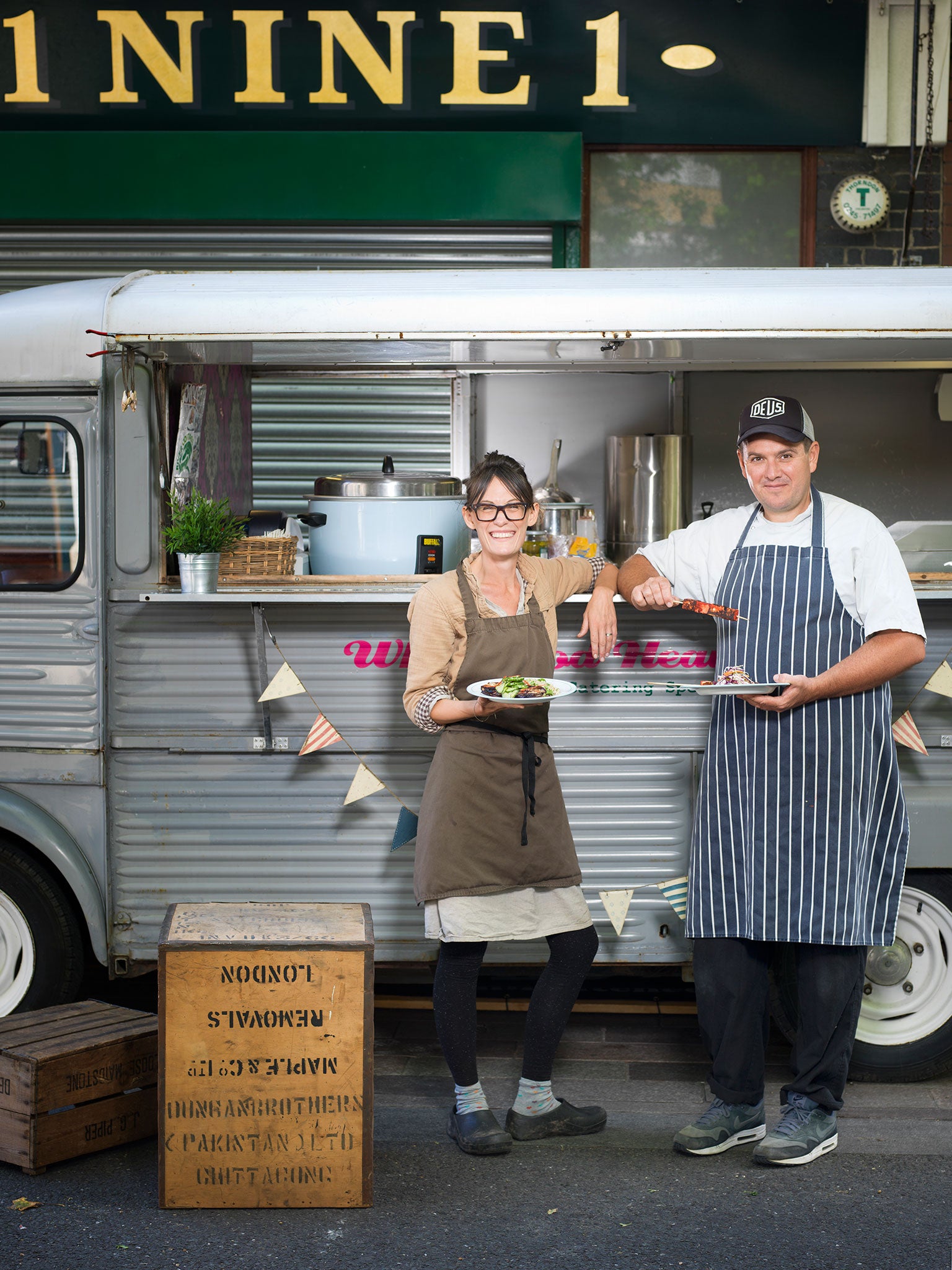
David and Charlotte Bailey, winners of a British Street Food award (britishstreetfood.co.uk – the next awards are in Leeds, 26-28 September), are at Whitecross Street Market, London EC1, most Thursday and Friday lunchtimes and at other events across the country. Their debut recipe book is being published in early 2015. Find them on their website, wholefoodheaven.co.uk, or on Twitter @veggie_heaven
Vegetarians have traditionally had a bit of a hard time finding good food at outdoor events. A token veggie burger from the depths of the freezer, cooked on the same grill as the meat, has long been all that's on offer. And so, keen to bring healthy, high-quality and interesting plant-based food to such occasions, in 2010 we snapped up a Citroën van and hit the road.
Vegetarian food at a barbecue should never be an afterthought, but something to get excited about. So here are some of our favourite street-food dishes adapted for the home barbecue, which we are sure even the meat eaters will try to snaffle!
Tandoori paneer kebabs with Asian 'slaw and lemon wedge
If it's ever possible to have had enough of halloumi, paneer is another brilliant cheese for the barbecue. The smell of the spices grilling in this recipe, inspired by holidays in India, will instantly transport you to a sunnier place. Try to start this the day before the barbecue, so the cheese can marinate properly.
Serves 4
For the kebabs
250g natural yoghurt
Juice ½ lemon
500g paneer, cut into 3-4cm cubes
4 bamboo skewers (soak in water overnight so they won't burn on the barbecue as easily)
2 tbsp vegetable oil
For the Spice Mix
2 dried long red chillis
10g coriander seeds
1 tsp cumin
½ tsp black peppercorns
½ tsp cloves
2 cardamom pods
½ tsp fenugreek
1½ cinnamon sticks
½ tsp ginger powder
½ tsp garlic powder
¼ tsp nutmeg, grated
¼ tsp ground turmeric
3 tsp paprika
For the 'Slaw
¼ white cabbage, finely sliced
¼ red cabbage, finely sliced
½ white onion, finely sliced
2 carrots, grated
¼ bunch mint, roughly chopped
2-3 tbsp mixed seeds
2 spring onions, thinly sliced
50ml agave
75ml rice vinegar
1 tsp sesame oil
To serve
1 lemon, cut into wedges
Begin with the tandoori spice mix. One at a time, toast the chillis, coriander, cumin, peppercorns, cloves, cardamom, fenugreek and cinnamon in a dry, hot pan until each begins to colour. They have to be done separately as they take different times to toast. Mix them in a bowl with the other, untoasted, spices and use either a coffee grinder or pestle and mortar to make a powder.
In a bowl, mix the powder with the natural yoghurt and lemon juice. Add the paneer cubes and mix well before covering with clingfilm and placing in the fridge to marinate for as long as possible, ideally overnight.
On the day of the barbecue, prepare the 'slaw by placing all the vegetables and seeds in a bowl. In a separate bowl, mix the agave, rice vinegar and sesame oil, pour over the vegetables and mix.
Put the paneer on the skewers and drizzle over the oil. Char-grill evenly on each side until they take on a good colour. Serve with a spoonful of 'slaw and a generous wedge of lemon.
Teriyaki aubergine with cucumber pickle and herby rice
This is sure to get your tastebuds going with its classic mix of sweet and salty. The coolness of the pickle undercuts it brilliantly.
Serves 4
For the teriyaki sauce
125ml sake
125ml tamari
12ml mirin
50g brown sugar
15g ginger, grated
1 clove garlic, finely chopped
½ tsp umami paste (optional)
1 tbsp cornflour
For the pickle
75ml rice vinegar
75g brown sugar
1 cucumber, thinly sliced
50g sesame seeds
For the rice
300g brown rice, cooked
½ bunch coriander, finely chopped
¼ bunch mint, finely chopped
25ml tamari
Zest and juice ½ lemon
For the aubergine
2 aubergines, cut lengthways into 5-7cm thick slices
2 tbsp olive oil
To serve
1 spring onion, finely sliced
1 red chilli, finely sliced
To make the teriyaki, get your pan very hot and flambé the sake then add the tamari, mirin, sugar, ginger, garlic and umami, if using. Bring to the boil and simmer for 5 minutes. Meanwhile, in a small bowl, add 1 tbsp of water to the cornflour and mix well. Add to the pan and cook for 2 minutes, whisking until it shows signs of thickening. Leave to one side.
To make the cucumber pickle, heat the rice vinegar and sugar in a pan, stirring until the sugar is dissolved. Set aside to cool, before pouring over the cucumber and adding the sesame seeds.
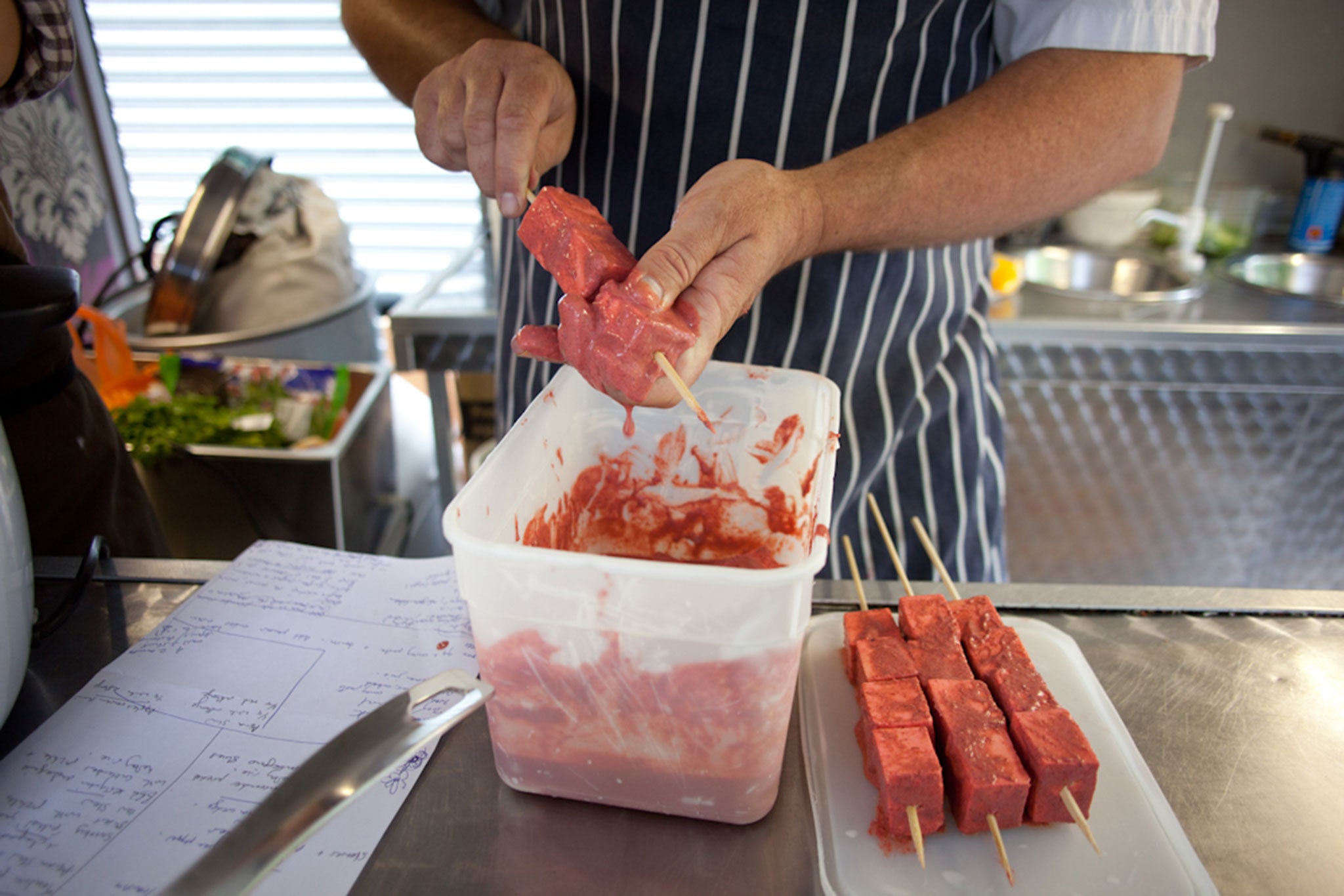
For the rice, mix the herbs through the cooked rice. Add the tamari and lemon juice and zest.
At the barbecue, brush the oil over the aubergine and barbecue on each side for 4 to 5 minutes, till nicely coloured. Arrange on a plate and drizzle over the teriyaki sauce before garnishing with the chilli and spring onion. Serve with the cucumber pickle and the herby rice on the side.
Smoky pulled jackfruit sliders with pickles and fruity 'slaw
Who would have thought that jackfruit – that strange Asian fruit that looks a bit like a flail – could look so much like pulled pork? Here we're using tinned jackfruit, which you can pick up online; just make sure it's in water, not syrup.
Makes 4 sliders
For the jackfruit
4 tbsp olive oil
2 small onions, chopped
4 cloves garlic, crushed
2 cans jackfruit, in water, drained and cut into small quarters
800ml vegetable stock
2 tsp thyme, chopped
1 chipotle chilli, soaked and chopped
2 tbsp apple-cider vinegar
2 tsp tamari
2 tbsp molasses
½ tsp mustard powder
Black pepper, to season
For the sauce
1 tbsp olive oil
3 cloves garlic, crushed
1 small onion, chopped
2 tbsp thyme, chopped
1 tbsp molasses
1 chipotle chilli, soaked and chopped
30ml rum
10ml red-wine vinegar
30ml tamari
300ml ketchup
Salt and pepper to season
For the 'slaw
¼ white cabbage, finely sliced
3 carrots, grated
1 medium onion, finely sliced
1 Granny Smith, finely sliced
Handful golden raisins
3-4 tbsp mayonnaise
To serve
4 brioche or other buns, halved
Gherkins or pickle of choice, sliced
While the jackfruit cooks, make the sauce. Heat the oil in a pan and fry the garlic, onion and thyme for two minutes, then add the molasses and chipotle. Allow to caramelise for a minute then add the rum, vinegar and tamari, and cook for two more minutes. Add the ketchup, mix thoroughly, bring to the boil and simmer for 10 to 15 minutes.
For the 'slaw, combine the cabbage, carrots, onion, apple and raisins in a bowl, spoon over the mayonnaise, season, and mix.
Put the jackfruit in a skillet and place it on the barbecue. Once it has begun to colour, spoon over 4 to 5 tbsp of the sauce. Continue until thoroughly heated.
To serve, load the buns with the jackfruit, an extra dollop of sauce, a spoonful of 'slaw, and add pickles on the side.
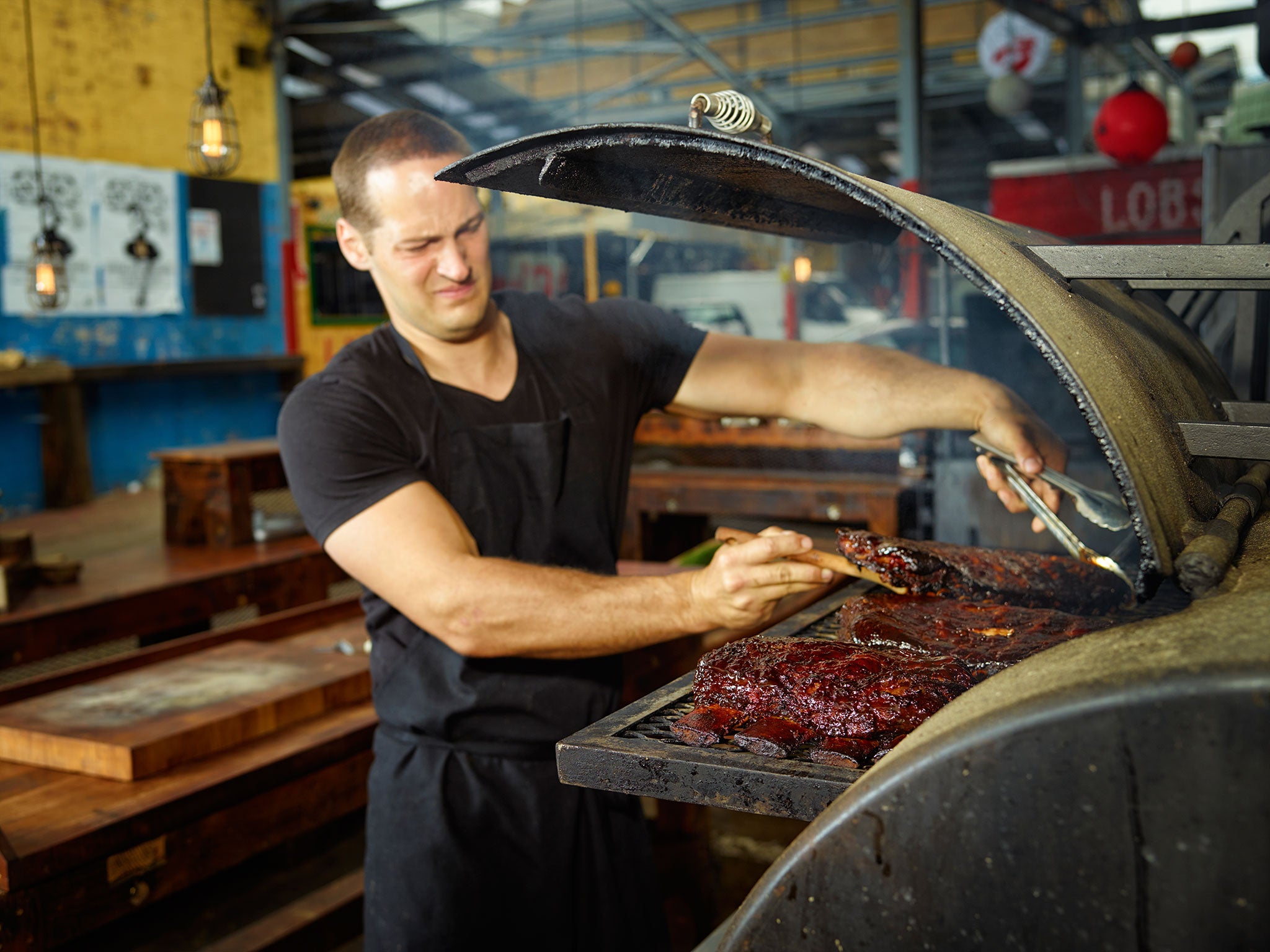
David Carter (pictured above) runs Smokestak, which can be found every Friday and Saturday for the rest of the summer with the Street Feast collective at both Dalston Yard and Model Market in Lewisham, south London. Smokestak will also be touring UK festivals this summer. For more, see their website, smokestak.co.uk, or on Twitter, follow @smokestakuk
I launched Smokestak last summer with a 4.5 tonne custom-fabricated barbecue smoker "train". Imported from southern Texas, this beast of a barbecue is the largest of its kind in the UK. We focus on slow-smoked meats over English oak with the use of home-made rubs for seasoning.
Unlike grilling, which is done over direct, high heat, smoking is cooking over indirect heat at low temperatures for a long time, using wood chunks (we use kiln-dried English oak chunks from the London Log Company). This causes the meat fibres to break apart and the result is a succulent, tender piece of meat or fish.
If you have some cash to spend, I'd recommend the Weber Smokey Mountain, which costs around £350. It's good at holding its temperature for long periods of time. You can smoke on a regular charcoal-grill barbecue as long as you ensure you keep the meat away from any direct heat: Google "charcoal fuse" for a quick and easy way to convert your regular charcoal grill into a smoker.
On an "offset" BBQ, the meat is smoked between 110C and 130C. When the temperature of the meat reaches 85-90C, it's ready. This method of barbecue requires temperature control. Most smoker barbecues you buy off the shelf feature an internal thermometer. However, we suggest using a digital probe thermometer, as you need to be taking not only the air temperature of the smoker but also the internal temperature of the flesh being smoked.
I have put together some recipes to try at home (including an additional breadfruit recipe for a regular, non-smoker barbecue). Some are more ambitious than others, but the more time you put in, the better your results will be.
Smoked beef short rib and pickled red chillies
A simple cut of meat and very forgiving. Beef ribs are a little more expensive to buy, but they are one of the most impressive cuts. Pickled red chillies are a perfect accompaniment, as their heat balances the palate.
Serves 4
For the rib
1 rack of Jacob's ladder or beef short rib (4 bones)
For the meat rub
2 parts Maldon sea salt
1 part fresh cracked black pepper
For the barbecue sauce
2 large onions
8 cloves garlic
500ml vinegar
750ml apple juice
2 litres ketchup
50ml Worcester sauce
100g dark brown sugar
10g ground cumin
10g red chilli flakes
Salt & pepper, to taste
For the chillies
Four red chillies, chopped
80g sugar
100ml water
250ml apple-cider vinegar
½ tsp coriander seeds
½ tsp white peppercorns
½ tsp mustard seeds
Season the rib generously. Smoke at 120C for 6 hours or until the meat reaches 85-90C.
For the sauce, finely chop the onions and caramelise in a large pan; add the garlic, and sauté for 2 minutes. Add the vinegar and reduce to a thick syrup. Add the apple juice, reduce by half. Add the ketchup, Worcester and sugar.
Toast the spices in another pan, then add these to the main pan. Simmer for 2 hours until the syrup is thick enough to coat the back of a spoon. You can put this back in the smoker for a further 2 hours for extra oompf.
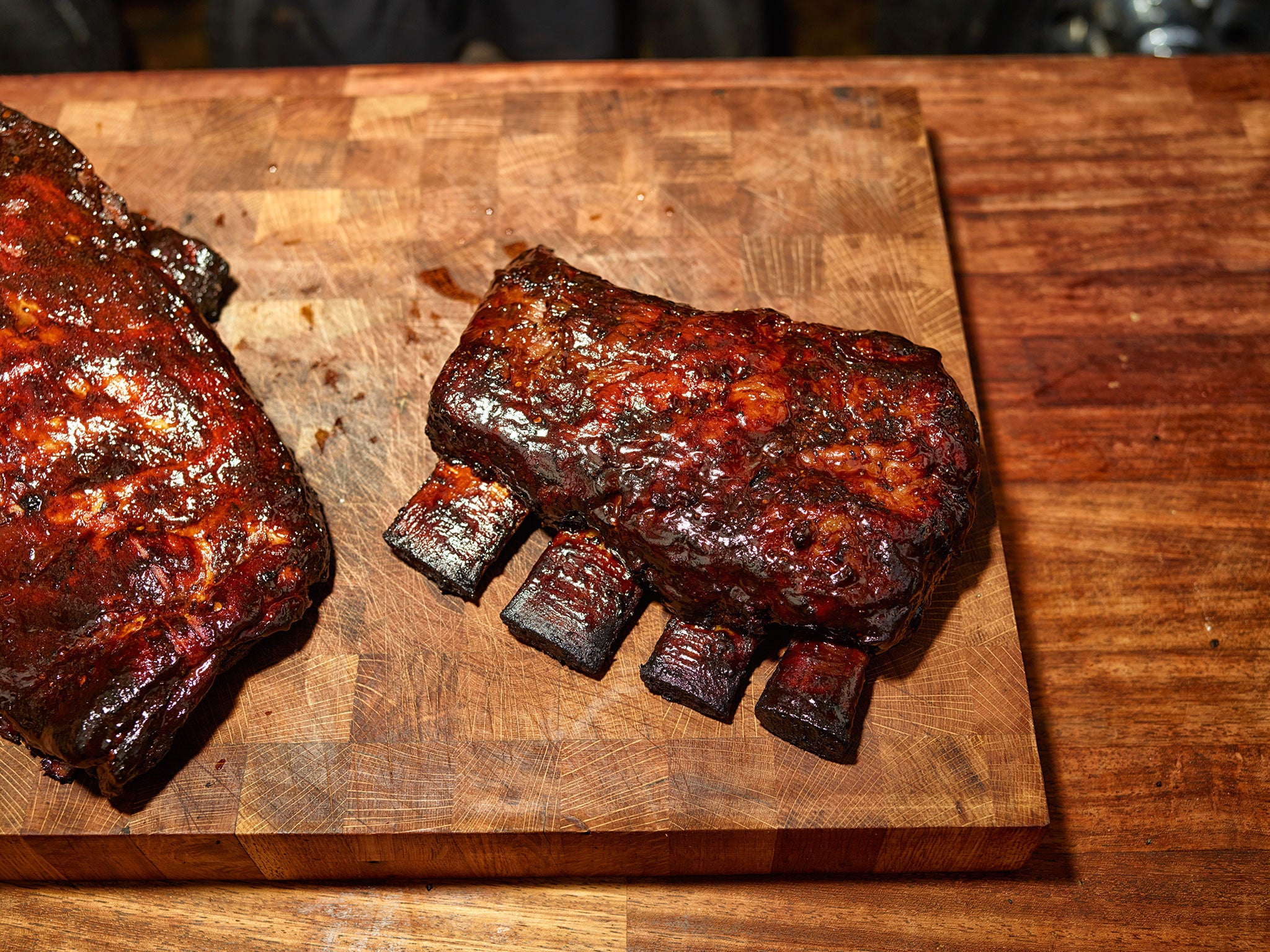
Glaze the rib with the barbecue sauce 20 minutes before the desired serving time. It's ready to go when the meat reaches 85-90C and is a rich, dark colour.
Meanwhile, make the pickled chillies. Start by slicing the chillies into a pot. In a separate pot, place the sugar, water, apple-cider vinegar and a pinch of salt. Toast all the spices in a small pan over a medium flame then add to the mixture, allowing to it to boil. Finally, throw everything in together and allow to sit for half an hour. Decant into a jar.
Once the ribs are cooked, allow them to rest on a cooling rack for 20 minutes. Slice the bones individually, sprinkle with salt and serve with a heaped spoonful of pickled red chillies on the side.
Hot-smoked, cured salmon with a maple, lemon and dill glaze
Curing the flesh draws out the moisture from the fish, in turn pronouncing the flavours. The smoking stage then encourages a subtle taste of oak, which is complemented by the sweetness of the final maple glaze.
Serves 4
Whole side of salmon
For the cure
1kg demerara sugar
250g Maldon sea salt
Zest and juice 2 lemons
4 cloves garlic
For the glaze
200g demerara sugar
250ml water
Zest and juice 2 lemons
100ml maple syrup
Few sprigs fresh dill
To serve
½ lemon
Cover the fish tightly with cling film and refrigerate for 8 to 12 hours. This draws out a lot of the moisture in the fish, so you will end up with a very damp mixture. When you remove it, wash off the curing solution. Pat dry with paper towel and allow to air-dry for two hours.
Prepare the glaze. Dissolve the sugar in the water over a high heat, being careful not to let the sugar burn. Add the lemon zest then juice, the maple syrup then some roughly chopped dill.
Smoke the fish at 100C for 30 minutes, applying the glaze every 10 minutes. The fish is done when it's slightly firm to the touch. If you're not sure, flake off a piece from the centre and ensure most of the pink has turned slightly. Serve with a few more brushes of the glaze and half a lemon.
Breadfruit
This is wholesome, back-to- grass-roots, heritage Caribbean soul food – a cross between a Jamaican sweet potato and plantain in taste and texture, being very starchy with a slight sweetness.
It's best when slow-roasted over hot coals until fork-tender, served with butter and salt. No fuss.
Serves 4
1 whole breadfruit
Roast over coals until it comes apart easily when you insert a fork. Slice into eighths. Add a generous dollop of butter and sprinkle of salt and serve.
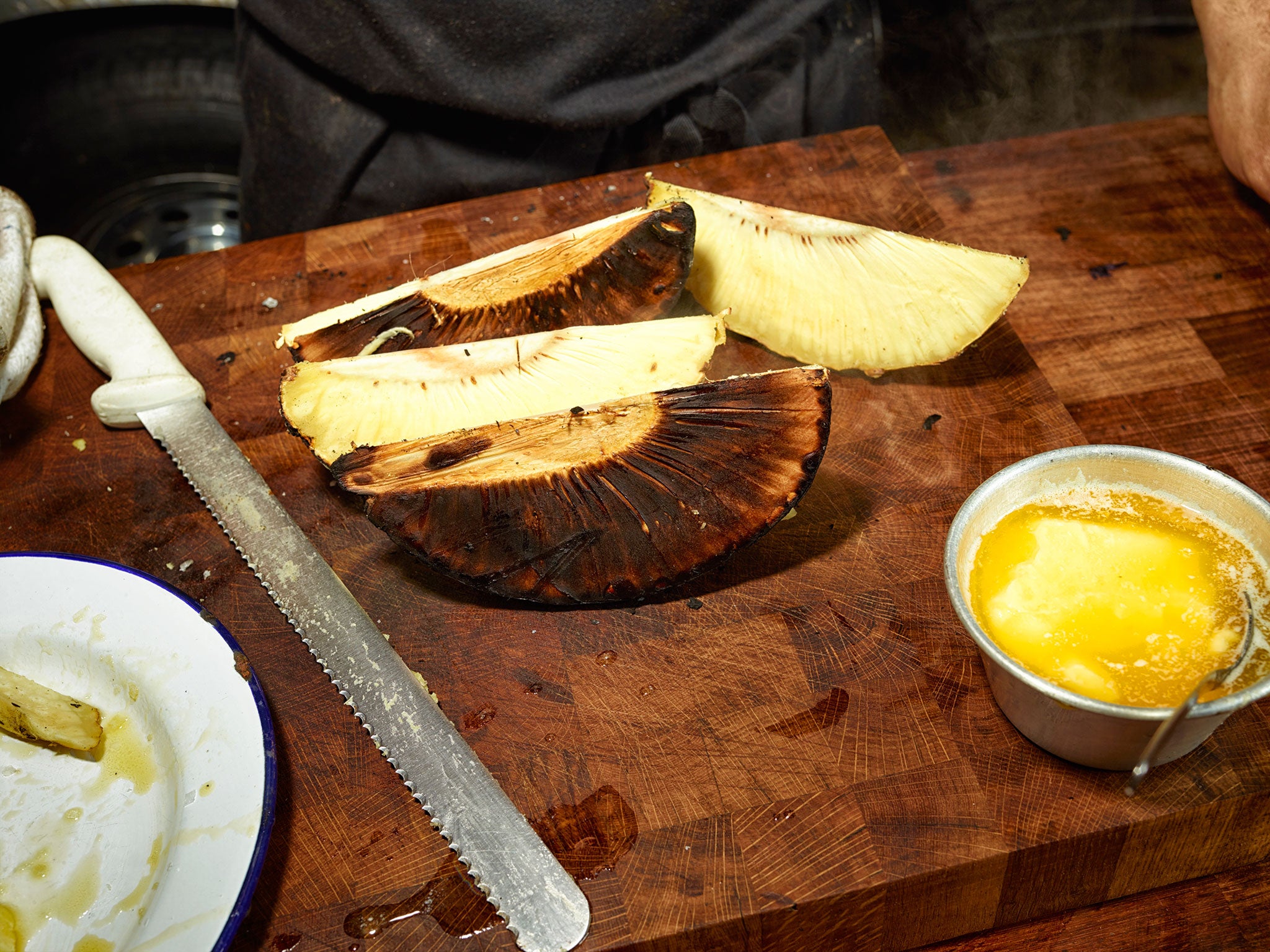
Pork-belly ribs with barbecue sauce and 'slaw
This is an all-time favourite among barbecue lovers, as the fall-off-the-bone, rich caramelisation of sugars from the rub and sauce work so well with the fat of the meat. This is the cut that gave us our name.
Serves 4 (2-3 ribs per person)
For the pork ribs
1 rack of pork belly ribs (thick-cut/3cm thickness all the way around)
100ml apple juice, to spray
For the rub
1kg demerara sugar
100g salt
50g ground black pepper
100g paprika
100g onion powder
100g garlic powder
50g mustard powder
30g dried thyme
15g red chilli flakes
For the barbecue sauce
As per the short-rib recipe
For the 'slaw
1 head cabbage
½ head red cabbage
4 carrots
10 green chillies (optional)
500ml vinegar
250g caster sugar
Salt to taste
For the rub, mix the ingredients together, then work into the pork ribs generously. Smoke for 4 to 5 hours at 130C. Spray with apple juice often and add a second layer of rub over the top after the first hour. Prepare the barbecue sauce as per the short-rib recipe, and 30 minutes before finishing, glaze the ribs with the sauce.
While cooking, prepare the 'slaw: grate the cabbage and carrots, fine-chop the chillies (with seeds), mix. Add the vinegar and sugar and season with salt.
The ribs are done when the internal temperature of the meat reaches 85C. At this point, the meat should come right off the bone without falling apart. (If the pork is overdone, it will become total mush.)
Join our commenting forum
Join thought-provoking conversations, follow other Independent readers and see their replies
Comments